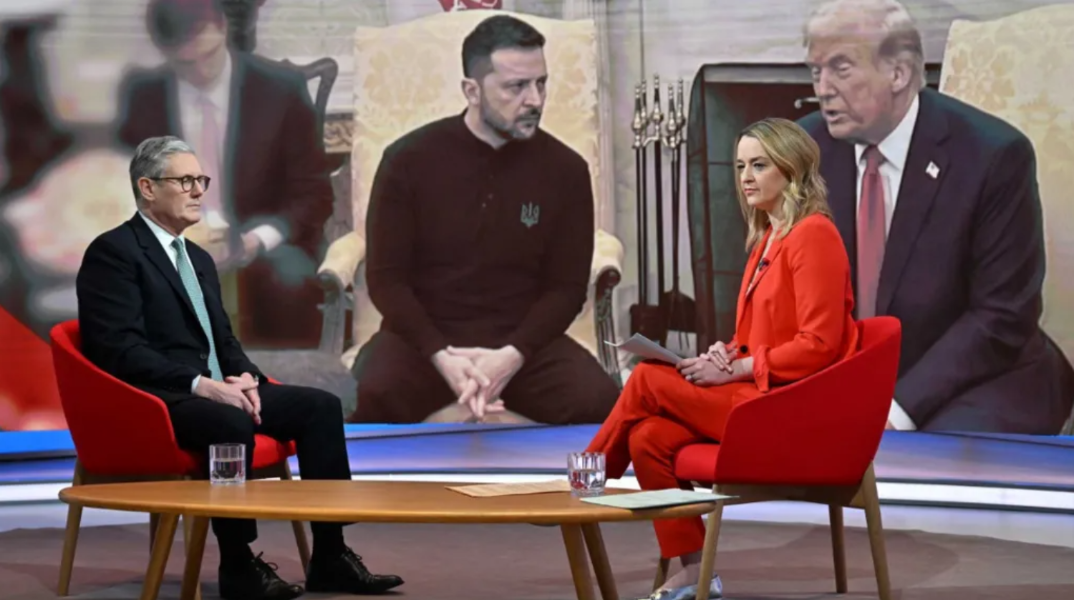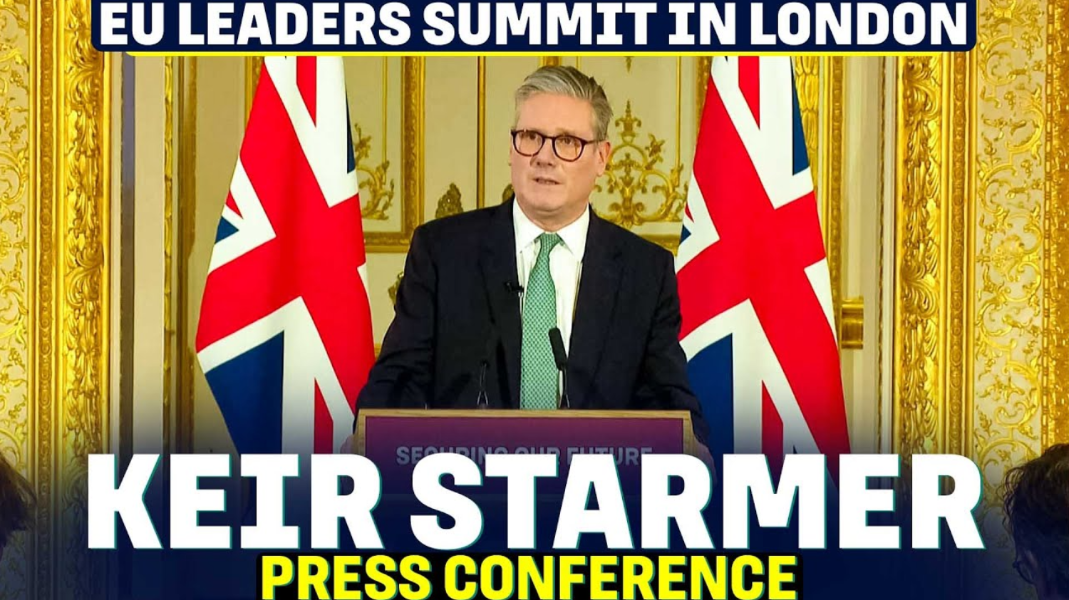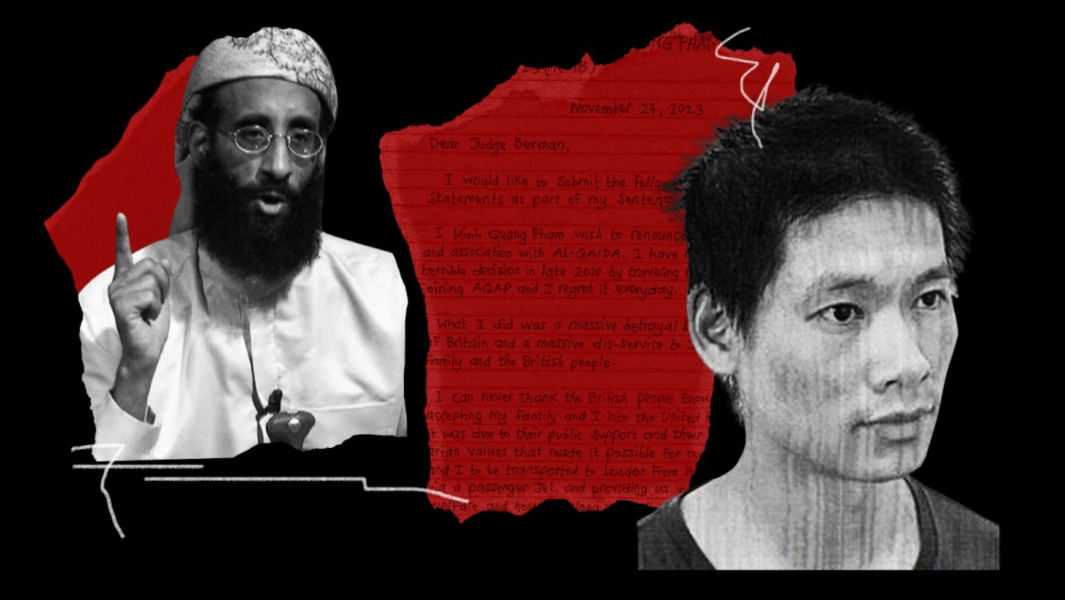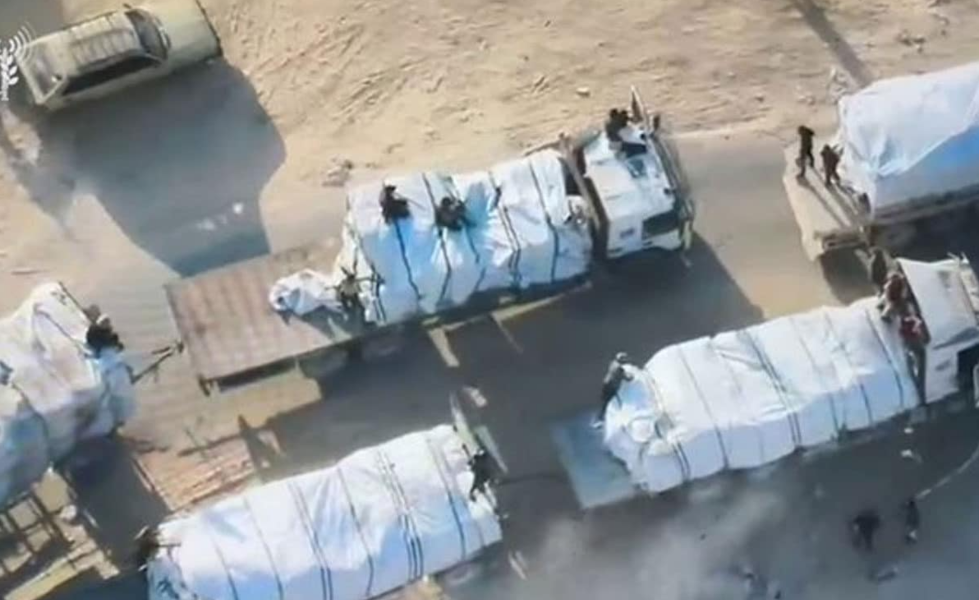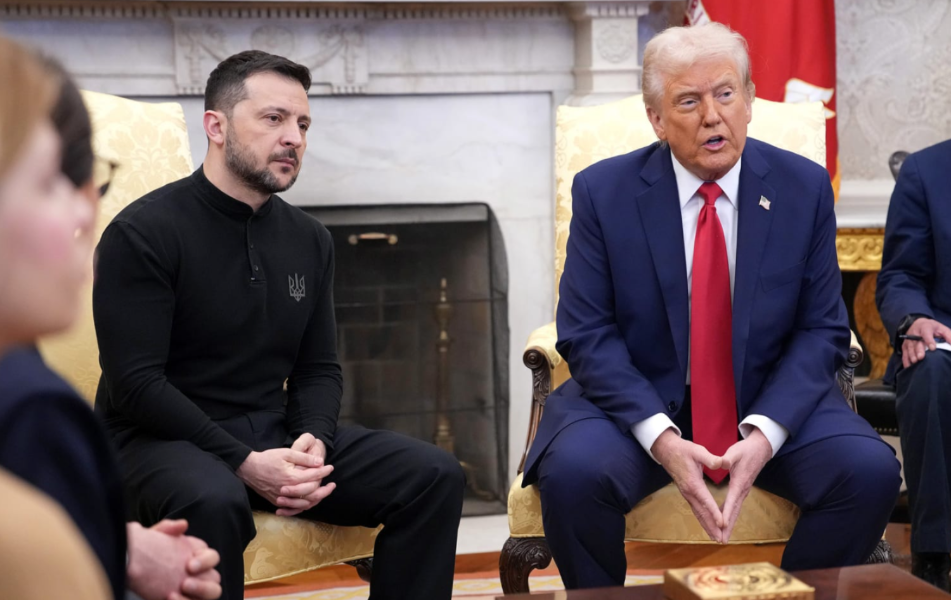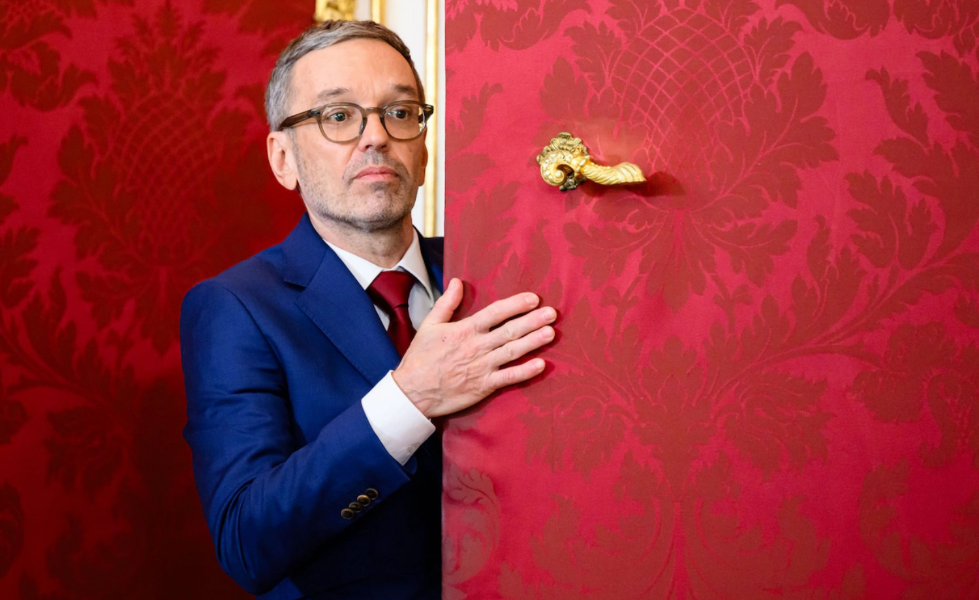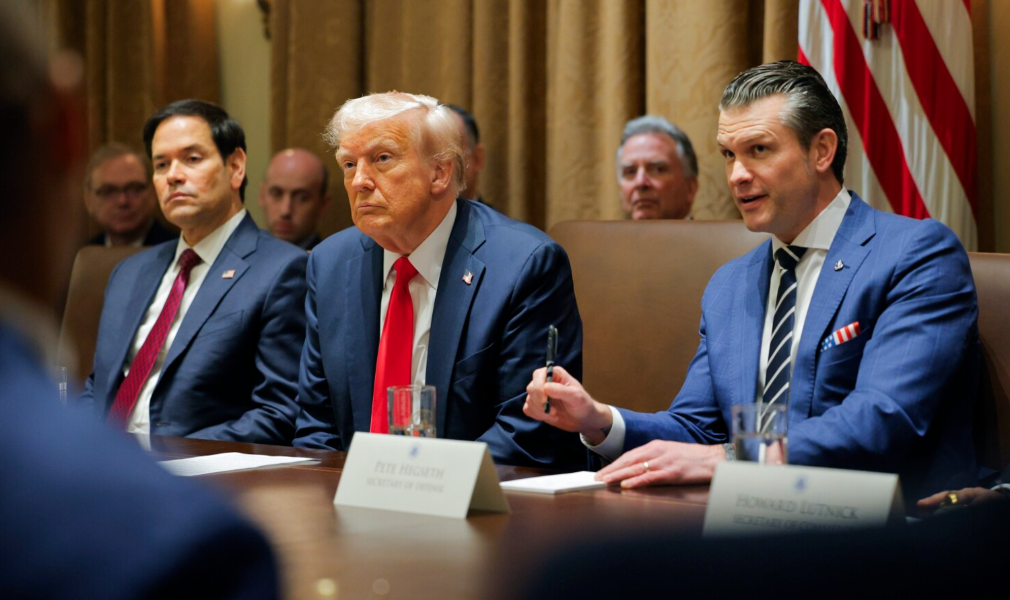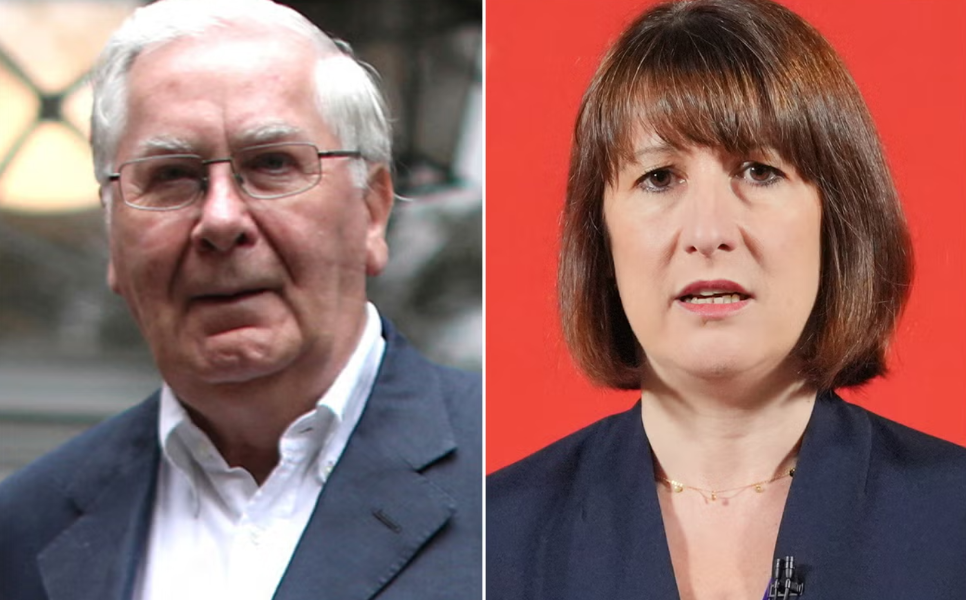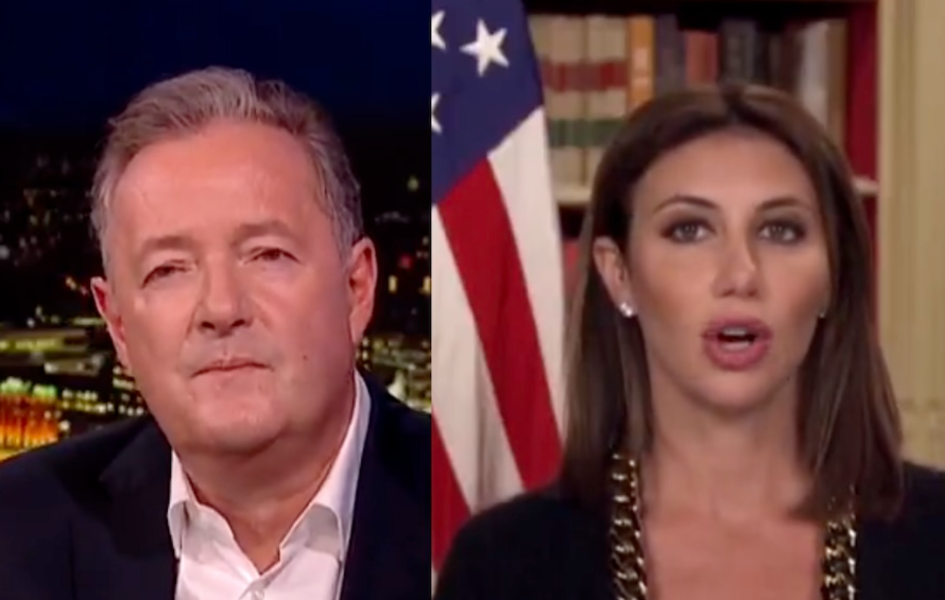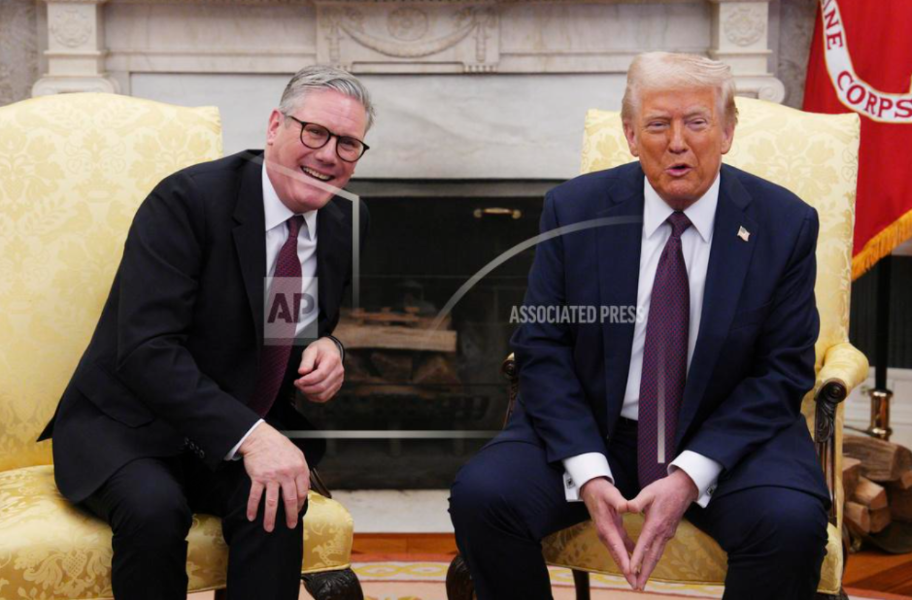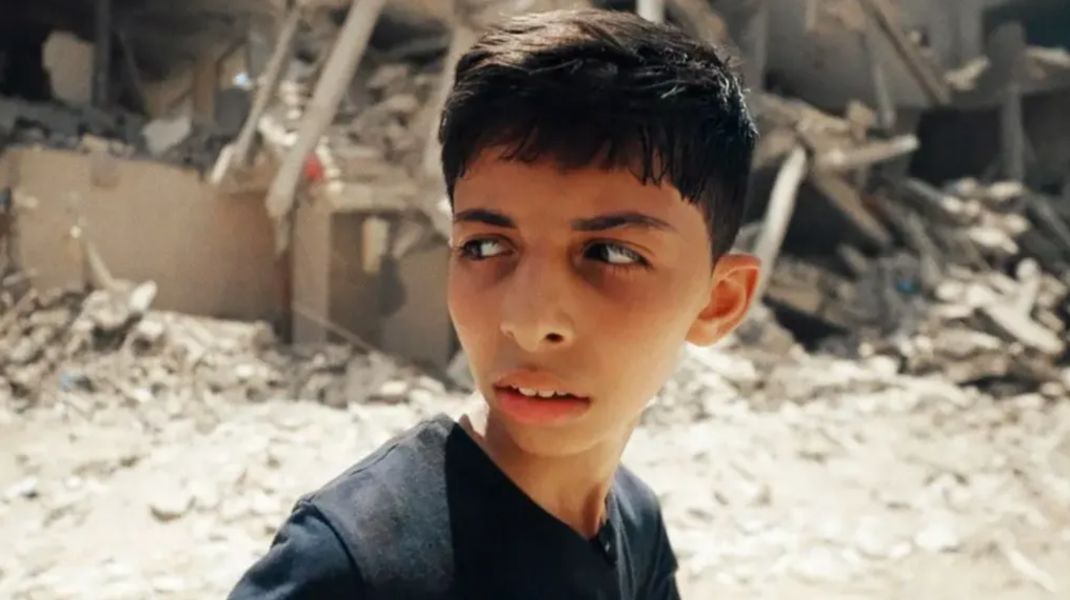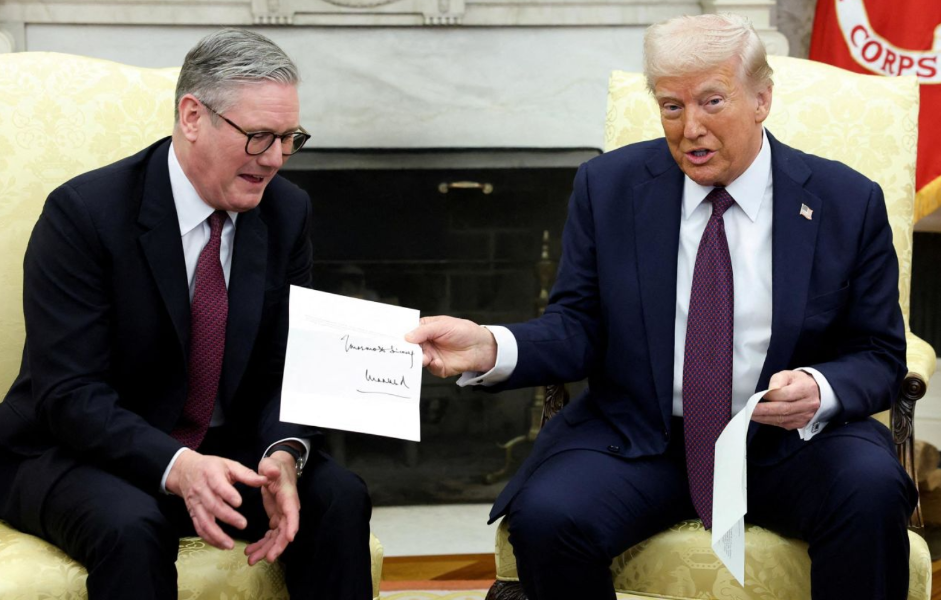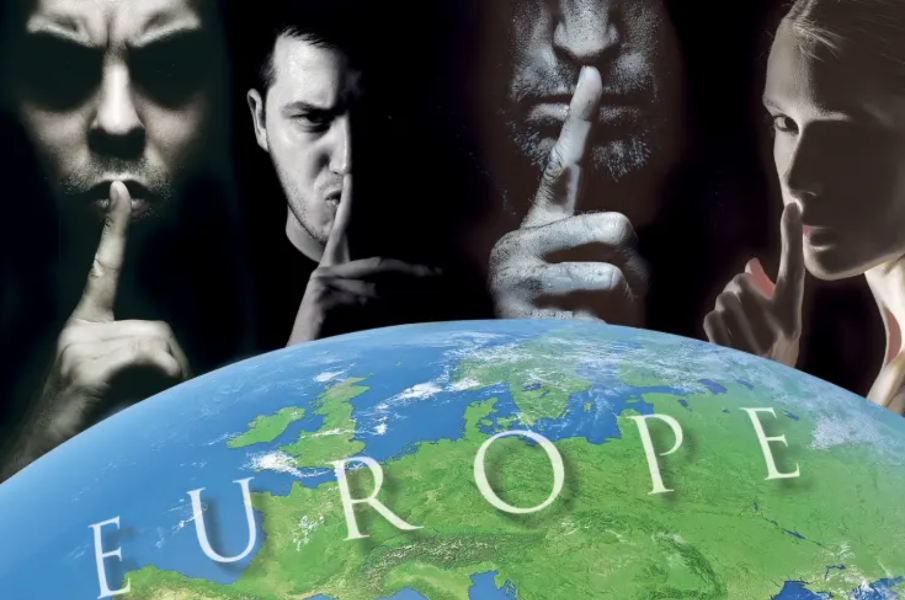-
Posts
10,807 -
Joined
-
Last visited
Content Type
Events
Forums
Downloads
Quizzes
Gallery
Blogs
Everything posted by Social Media
-
Prime Minister Sir Keir Starmer has emphasized his commitment to acting as a "bridge" between U.S. President Donald Trump and Ukrainian President Volodymyr Zelensky as the UK and France work on a plan to bring an end to the ongoing war in Ukraine. He stated that the UK and France would first collaborate with Ukraine to develop a strategy and then "discuss that plan with the United States." "There are a number of different routes people can go down. One is to ramp up the rhetoric as to how outraged we all are or not," Sir Keir said. Instead, he opted to "roll up my sleeves" and engage in direct conversations with both Trump and Zelensky, as well as French President Emmanuel Macron, about Europe's role in securing peace. "Because my reaction was we have to bridge this, we have to find a way that we can all work together because in the end we've had three years of bloody conflict now, we need to get to that lasting peace," he explained. During his interview with BBC One’s *Sunday with Laura Kuenssberg*, Sir Keir avoided assigning blame for the White House confrontation. When asked directly if he believed Trump could be trusted, he responded unequivocally, "yes," adding that he was "clear in my mind" that Trump "wants a lasting peace." He also affirmed that Zelensky could be trusted but maintained that Russian President Vladimir Putin could not, reinforcing the need for the United States to provide a security guarantee for any eventual peace agreement. The Prime Minister acknowledged that a European security guarantee would need to be led by a "coalition of the willing." As efforts continue, Starmer appears determined to position the UK as a key diplomatic force in brokering a resolution to the war in Ukraine. Based on a report by BBC 2025-03-03
-
Prime Minister Keir Starmer has outlined a four-step approach to bolster Ukraine’s defense and ensure a lasting peace, emphasizing that any agreement must be rooted in strength and shared responsibility among nations. He insists that all countries must contribute effectively, stepping up their support to reinforce Ukraine’s security. While Europe takes the lead, Starmer acknowledges that U.S. support remains crucial. He states, “Let me be clear, we agree with Trump on the urgent need for a durable peace. Now we need to deliver together.” If a peace agreement is reached, European leaders will work to deter future Russian aggression, forming what Starmer refers to as a “coalition of the willing” to defend Ukraine and guarantee peace. “We are at a crossroads in history today,” he declares. “This is not a moment for more talk – it’s time to act and unite around a new plan for a just and enduring peace.” He dismisses concerns about America’s reliability as an ally, asserting, “I do not accept that the U.S. is an unreliable ally. There are no two countries as closely aligned as ours.” Starmer reveals that discussions have been progressing with U.S. leaders, emphasizing that the UK’s efforts are in collaboration with Washington. “This is a plan we’re working toward with the U.S., and with U.S. backing. That is why I spoke to Trump last night.” Though he does not disclose details of their conversation, he assures that he would not be moving forward with this strategy unless he believed in its success. He also warns of the consequences of inaction, reminding leaders that instability in Europe inevitably impacts the UK. “The one thing our history tells us is that if there is conflict in Europe, it will wash up on our shores,” he says. Several countries have already expressed interest in being part of the coalition, though Starmer allows them to decide how they wish to publicly announce their contributions. During the summit, Italian Prime Minister Giorgia Meloni echoed similar concerns, warning against a fragile peace agreement. “The one thing we absolutely cannot afford is a peace [in Ukraine] that does not last,” she says. “We must be very careful when assessing what is being proposed, particularly in response to this key question: could this peace be violated? Because, unfortunately, we have seen this happen in the past.” Outgoing German Chancellor Olaf Scholz reaffirmed on social media that NATO remains central to transatlantic security. He highlights the alliance’s recent growth and increased defense spending, stating, “That is the path we will continue to follow in the future as well.” Similarly, Dutch Prime Minister Dick Schoof stresses the importance of Europe taking on a greater role in securing the continent while maintaining strong transatlantic ties. “Good transatlantic relations are also indispensable,” he writes. As the world watches, Starmer’s proposed steps signal a unified effort to fortify Ukraine’s defenses and build a resilient peace, ensuring Europe remains prepared for the challenges ahead. Based on a report by BBC 2025-03-03
-
Minh Pham arrived in Britain as a six-year-old refugee, fleeing the turmoil of post-war Vietnam with his family. Decades later, he admitted to a shocking betrayal—plotting a suicide bombing at Heathrow Airport on behalf of al-Qaeda, intending to kill hundreds of innocent people during the Christmas season. Al-Qaeda leaders directed Pham to strike the airport’s arrivals hall, where he would not need to pass through security. His bomb was to be packed with shrapnel coated in rat poison to maximize casualties. Prosecutors in the United States, where Pham was recently sentenced, revealed chilling details of his preparations. Footage recovered from a laptop in Yemen showed him constructing and testing explosives, grinning as he practiced triggering detonators while wearing a rucksack. “In the real world, that green light could mean dozens, or even hundreds, of deaths,” prosecutors stated. The same laptop contained a six-page document titled “Your Instructions,” written by Anwar al-Awlaki, the infamous American-born al-Qaeda leader. Awlaki provided Pham with precise directions, including the suggestion to poison the shrapnel. This newly uncovered evidence directly contradicted Pham’s previous claims that he never intended to carry out an attack on UK soil. Pham’s planned attack was set for 2011, but his capture prevented it from happening. Intelligence agencies warn that terrorist groups like al-Qaeda and ISIS are regrouping, aiming to launch large-scale attacks once again. Sir Ken McCallum, director-general of MI5, recently warned, “Organised groups have the numbers and the know-how to carry out, or inspire, horrendous mass casualty attacks.” Last month, Pham, now 42, was sentenced to 44 years in a maximum-security US prison after pleading guilty to multiple terrorism charges. His case marks the end of a 15-year saga spanning three continents and leaving a fractured family behind. Pham’s journey began in 1983 when he was born in Vietnam. Just a month later, his parents fled the war-ravaged country, making the perilous journey by boat to Hong Kong. They spent six years in a refugee camp before being granted asylum in Britain in 1989, settling in south London. His father worked as a cleaner, while his mother raised Pham and his three younger siblings. The family became British citizens in 1995. As a young man, Pham attended Ravensbourne College of Design and Communication, where he studied graphic design. He lived a carefree life, attending raves and experimenting with drugs. But everything changed in 2004 when he converted to Islam. His path soon led him to Yemen, where he joined al-Qaeda in the Arabian Peninsula (AQAP), then considered one of the most dangerous branches of the terrorist network. In 2009, AQAP attempted to bring down a transatlantic flight with an explosive hidden in an operative’s underwear—a plot that ultimately failed. Pham traveled to Yemen in 2010, staying for seven months before returning to the UK in July 2011. Upon arrival at Heathrow, he was found carrying an armor-piercing bullet and was placed under MI5 surveillance. By December 2011, Home Secretary Theresa May had stripped him of his British citizenship due to national security concerns. Police searches of his home revealed that he had been accessing Awlaki’s radical sermons. Meanwhile, US authorities built a case against him, using testimony from a captured al-Qaeda operative who had encountered Pham in Yemen. In 2015, Pham was extradited to the United States and later pleaded guilty to charges including receiving terrorist training and producing propaganda for AQAP’s magazine, Inspire. During FBI interrogations, Pham admitted that Awlaki had ordered him to carry out the Heathrow attack. He also confessed to receiving £5,000 and a “clean” laptop for the mission. However, he claimed he only agreed to the plot as a way to return to Britain, insisting he never intended to go through with the attack. Based on this assertion, a judge initially gave him a more lenient sentence. A year later, in 2017, US investigators uncovered new evidence—a laptop found in Yemen containing footage of Pham testing explosives and a detailed blueprint for the Heathrow attack. Awlaki’s written instructions to Pham were also discovered, advising him to “target Christmas/New Year season” and providing step-by-step directions for building a deadly shrapnel bomb. Awlaki himself was killed in a US drone strike in 2011. Pham’s wife, a primary school teacher and scout leader, has since given birth to a second child. Their eldest, now 12, wrote to the judge handling the case, saying, “My cousins always ask about my father. I always have to reply that he is away in America. I never lie, but this is the only time I tell them he is away for work. If I tell them he is in prison, it would open up more questions, which I have no answer to.” Pham, now imprisoned in ADX Florence, a supermax facility in Colorado known as the “Alcatraz of the Rockies,” has had time to reflect on his actions. In a letter to the court, he wrote, “What I did was a massive betrayal to my country of Britain and a massive disservice to Islam, my family, and the British people.” Chief Superintendent Helen Flanagan of the Met’s Counter Terrorism Command emphasized that Pham’s case is a sobering reminder of the persistent threat from organized terrorist networks. “Although there has been much recent media and public attention on radicalisation of individuals who may go on to develop intent to carry out relatively low-sophistication attacks, unfortunately there are still terrorist groups seeking to carry out more sophisticated and organized attacks,” she said. Minh Pham’s journey from a refugee seeking safety to a terrorist plotting mass murder is a chilling reminder of the dangers of radicalization and the ongoing global fight against terrorism. Based on a report by The Times & Sunday Times 2025-03-03
-
Despite mounting calls to revoke the state visit invitation extended to former US President Donald Trump, UK ministers have stood firm on the decision. The invitation, personally handed to Trump by Prime Minister Sir Keir Starmer during his visit to Washington, remains in place even after Trump's public dispute with Ukrainian President Volodymyr Zelensky. Criticism came swiftly from various political figures, including members of the Scottish National Party and a senior Conservative MP, who urged reconsideration following Trump’s treatment of Zelensky in the Oval Office. However, Starmer dismissed the pressure, accusing critics of “trying to ramp up the rhetoric” and reaffirming his focus on securing US support for a security guarantee in Ukraine. He emphasized that such support is “the single most important thing at stake in Europe.” The prime minister admitted feeling “uncomfortable” while watching the televised exchange between Zelensky, Trump, and US Vice-President JD Vance. However, rather than escalating tensions, he stated his commitment to working through diplomatic channels, saying he preferred to “roll up my sleeves” instead of engaging in public confrontation. Starmer’s approach highlights his broader strategy of maintaining a working relationship with Trump amid concerns about the future of US involvement in a Ukraine peace deal. The situation has exposed divisions within the Conservative Party, with Business Secretary Kemi Badenoch expressing sympathy for Zelensky, whose White House visit was abruptly cut short without securing a critical minerals agreement. Badenoch remarked, “I watched it and I couldn’t believe what was happening. He was being humiliated.” Meanwhile, Shadow Defence Minister Alicia Kearns took a stronger stance, arguing that state visits should only be “conferred to the most honourable of allies.” She insisted that Trump’s visit should not proceed until the US demonstrates unwavering commitment to its allies. However, Badenoch’s spokesperson distanced the party from Kearns’ comments, clarifying that “personal views of individual MPs are not official Conservative Party positions.” They also stressed that the state visit ultimately falls under the jurisdiction of King Charles, who extended the invitation. The King’s views on Russia’s President Vladimir Putin are well known. In 2014, while still the Prince of Wales, he drew a controversial comparison between Putin and Adolf Hitler. During a visit to Halifax, Canada, Charles told a museum volunteer whose Jewish family had fled Europe: “And now Putin is doing just about the same as Hitler.” Based on a report by Sunday Times 2025-03-03
-

Israel Hamas War the Widening Middle East Conflict
Social Media replied to Social Media's topic in The War in Israel
UPDATE: Israel says it’s stopping aid into Gaza over Hamas refusal to extend ceasefire’s 1st phase Israel has announced a halt to the entry of goods and supplies into Gaza, citing Hamas’s refusal to accept what it describes as an American proposal to extend the first phase of the ceasefire through Passover and Ramadan, alongside additional hostage releases. The decision was confirmed by the Prime Minister’s Office, which stated, “With the end of Phase 1 of the hostage deal, and in light of Hamas’s refusal to accept the [US special envoy Steve] Witkoff outline for continuing talks – to which Israel agreed – Prime Minister Netanyahu has decided that, as of this morning, all entry of goods and supplies into the Gaza Strip will cease.” The Prime Minister’s Office further emphasized that Israel will not agree to a ceasefire without the release of hostages. “Israel will not allow a ceasefire without the release of our hostages,” the statement read, warning of “further consequences” should Hamas continue to reject the proposal. According to the Kan public broadcaster, Israel assesses that the level of humanitarian aid that has entered Gaza in recent weeks is sufficient to sustain the region for several months. Reports indicate that during the deal, 4,200 trucks of aid per week were allowed into the territory, which Israel estimates could last for up to six months. The decision to adopt the "Witkoff" plan was announced last night by the Prime Minister’s Office. Under Israel’s account of the proposal, half of the remaining hostages—both those alive and those confirmed dead—would be released on the first day of the extended ceasefire. The remaining captives would be freed at the end of the period, provided that a permanent ceasefire agreement is reached. Currently, terror groups in Gaza are holding 59 hostages, including at least 35 individuals whom the Israel Defense Forces have confirmed to be deceased. The ongoing negotiations remain at an impasse, with Israel insisting on hostage releases as a condition for any further ceasefire extensions and Hamas refusing to accept the proposed terms. Based on a report by ABC News 2025-03-02 -
Senator Marco Rubio has called on Ukrainian President Volodymyr Zelensky to apologize to President Donald Trump, questioning whether Zelensky genuinely wants peace following their tense and disastrous meeting in the Oval Office. The confrontation unfolded on Friday, quickly spiraling out of control when Trump took offense to how Zelensky treated his vice president, JD Vance, in front of the cameras. Trump and Vance’s aggressive stance has already sparked international criticism, even from the United States' closest allies. When asked if Trump and Zelensky’s relationship was salvageable, Rubio referenced a 2022 incident in which Joe Biden lost his temper with Zelensky, calling it hypocritical to criticize Trump for his reaction. "I think anything is possible, but it has to go back to the point that President Trump is involved in this to bring about enduring, lasting peace." Despite the heated rhetoric, Zelensky later refused to apologize, though he expressed his desire for Trump’s support. Speaking to Fox News, he responded evasively when asked if he owed Trump an apology, ultimately refusing to concede wrongdoing. "I'm not sure we did something bad," Zelensky said. "We're thankful to Americans for all your support, you did a lot, I'm thankful to President Trump and Congress' bipartisan support. You helped us a lot from the very beginning, you helped us to survive. We are strategic partners." When pressed again, he maintained his position. "We have to be honest and we have to be direct with each other. Nobody wants to finish more than we do because we are in this war, in this battle for freedom for our lives." Zelensky made it clear that he wanted Trump to stand firmly behind Ukraine, saying, "I want President Trump to be more on our side." When asked if his relationship with Trump was repairable, Zelensky was optimistic. "Yes, of course, because it's relations more than two presidents. It's strong relations between our people, and that's why I always thank your people from our people." Based on a report by The Daily Mail 2025-03-01
-
Florida Governor Ron DeSantis has made it clear that controversial influencer Andrew Tate and his brother Tristan are "not welcome" in the state following their arrival in the U.S. after Romania lifted travel restrictions related to their pending criminal case. "Florida is not a place where you’re welcome with that type of conduct," DeSantis stated at a press conference in response to questions about the Tate brothers. Upon their departure, their plane landed in Fort Lauderdale around noon, confirmed their spokesperson, Mateea Petrescu. DeSantis also stated that Florida's Attorney General is evaluating legal options regarding the brothers' presence in the state. "Our Attorney General, James Uthmeier, is looking into what state hooks and jurisdictions we have to deal with this," he told reporters. The reason behind Romania's decision to lift the travel restrictions remains unclear. However, Romania's Prime Minister Marcel Ciolacu has denied reports that the Trump administration exerted pressure on Romanian authorities to allow the Tates to leave the country. "The United States of America has made no request to Romania regarding the legal status of certain well-known foreign influencers under investigation by Romanian authorities," Ciolacu posted on X last Tuesday. "There were no such requests during the discussion between the Foreign Ministry and Richard Grenell, nor afterward." President Trump has also distanced himself from the matter, telling reporters in the Oval Office, "I know nothing about that. We’ll check it out. We’ll let you know." Andrew and Tristan, who hold both U.S. and British citizenship, were arrested in Romania in late 2022 and formally indicted last year on charges of participating in a criminal sex ring that lured women to Romania. Additionally, four women in the UK have accused Andrew Tate of rape and coercive control, filing a civil case against him in his birthplace. In a joint statement on Thursday, the accusers expressed outrage over the Tate brothers' ability to leave Romania. "We are in disbelief and feel re-traumatized by the news that the Romanian authorities have given into pressure from the Trump administration to allow Andrew Tate to travel around Europe and to the US," they said. Although a Romanian court ruled in December that the case against the Tate brothers could not proceed to trial due to multiple legal and procedural irregularities by prosecutors, the investigation remains open, and they continue to face legal scrutiny in Romania. Based on a report by NYP 2025-03-01
-
The far-right Freedom Party of Austria (FPO) has been prevented from taking power despite emerging as the winner of the national election. FPO leader Herbert Kickl has condemned the newly formed government coalition—comprising the conservative People’s Party, the centre-left Social Democrats, and the liberal Neos—labeling it a “coalition of losers.” Following five months of political deadlock, Austria witnessed an unprecedented political arrangement on Thursday, as these three mainstream parties joined forces to form a government. Christian Stocker, the leader of the People’s Party, will assume the role of chancellor, while Social Democrat leader Andreas Babler will serve as vice-chancellor. Despite securing 28.9 per cent of the vote in September’s election, the FPO did not gain enough seats to govern alone. The party faced outright rejection from all other key political groups, which refused to cooperate with it. As a result, Austrian President Alexander Van der Bellen initially tasked Karl Nehammer, the then-leader of the conservatives and incumbent chancellor, with forming a government. However, when this attempt failed in January, the responsibility was temporarily handed to the FPO. While the so-called “firewall against the far-right” is not as firmly entrenched in Austria as in Germany, mainstream parties still maintained a united front against the FPO. In Germany, conservative leader Friedrich Merz recently attempted to push stricter migration laws with support from the far-right Alternative for Germany party, but his efforts were ultimately abandoned due to internal opposition within his Christian Democratic Union. The FPO, which has previously governed Austria twice, struggled to secure an alliance with the conservatives this time around, largely due to disagreements over foreign policy. The FPO is believed to advocate for closer ties with Vladimir Putin’s Russia, a stance that proved to be a significant sticking point. With the FPO’s coalition efforts collapsing in January, Austria’s mainstream parties resumed discussions in a desperate bid to prevent new elections, which polls indicate could deliver an even stronger mandate to the far-right. Their eventual agreement has been humorously dubbed the “sugar coalition” due to the resemblance of the parties’ colors to jelly beans. However, the alliance is expected to face significant challenges in governance. Many view it as an uneasy compromise rather than a unified front, driven more by the fear of an emboldened FPO than by ideological alignment. Recent polls suggest FPO support has surged to 34 per cent, making the party a strong contender in any future election. Following the announcement of the new coalition, Kickl remained defiant, declaring: “Today is not the end, I’ll be back, no question.” Austria has historically been a key testing ground for collaboration between conservatives and the far-right in German-speaking nations. The FPO first entered government in 2000 as part of a coalition with the conservatives and rejoined them in 2017. However, its recent exclusion underscores the broader European trend of mainstream parties resisting the normalization of far-right influence, even as its popularity continues to grow. Based on a report by The Telegraph 2025-03-01
-
The waters off New England continue to experience elevated temperatures, but the rate of warming has slowed compared to previous years, according to scientists studying the Atlantic Ocean near Maine. The Gulf of Maine, which borders three New England states and Canada, has been a focal point for climate change research due to its rapid warming—nearly three times faster than the global ocean average. This warming trend has significant implications for the region’s marine ecosystem, particularly for commercially valuable seafood species such as the American lobster. According to a recent report from the Gulf of Maine Research Institute in Portland, the average sea surface temperature in the gulf in 2024 was 51.5 degrees Fahrenheit (10.8 degrees Celsius). This was 0.88 F (0.49 C) above the long-term average from 1991 to 2020. While 2024 ranked as the 12th warmest year on record, it marked a decline from the fifth warmest year recorded in 2023. The past two years also saw back-to-back record-breaking temperatures, making this the third consecutive year of slight cooling. “The conditions seen in the Gulf of Maine were a departure from the record-setting temperatures seen elsewhere in the North Atlantic and across the world’s oceans,” the report stated. Despite this temporary slowdown, the overall trend remains concerning. The gulf’s average annual sea surface temperature has been rising at a rate of 0.84 degrees Fahrenheit per decade from 1982 to 2024—far exceeding the pace of global ocean warming. This warming has already begun to impact marine life, with scientists linking the decline in baby lobsters in the region to rising temperatures. Other vulnerable species, including Atlantic puffins and North Atlantic right whales, also depend on the gulf’s delicate ecosystem, which is facing increasing stress. The Gulf of Maine Research Institute attributes the rapid warming to several key factors. One major cause is the strengthening of the Gulf Stream, which carries warmer waters northward. At the same time, the weakening of the cold Labrador Current has reduced its ability to act as a protective barrier against this influx of warm water. The report also noted significant seasonal variations in 2024. While winter months saw below-average temperatures, June was recorded as the second warmest on record. Warmer-than-average sea surface temperatures persisted through summer and fall, whereas colder-than-average temperatures were observed during the winter months at both the start and end of the year. Although the slight cooling in 2024 offers a momentary shift in the trend, scientists caution that the long-term trajectory remains worrisome. The Gulf of Maine continues to serve as a critical indicator of climate change’s impact on ocean ecosystems, with potential long-term consequences for marine life and the seafood industry that relies on it. Based on a report by AP 2025-03-01
-
The Pentagon has issued an order mandating the removal of all transgender service members from the United States military unless they secure a waiver proving their ability to meet service requirements. This directive, outlined in a memo filed late Wednesday, states that individuals with a "current diagnosis or history of, or exhibit symptoms consistent with, gender dysphoria" will no longer be eligible to serve. The memo references President Donald Trump’s executive order signed in February, which asserts that "the medical, surgical, and mental health constraints on individuals who have a current diagnosis or history of, or exhibit symptoms consistent with, gender dysphoria are incompatible with the high mental and physical standards necessary for military service." The document instructs military leadership to identify transgender personnel within 30 days and to process their removal within an additional 30 days through honorable separation. "Service members being processed for separation in accordance with this policy will be afforded all statutorily required rights and benefits," the memo states. It allows for waivers on a case-by-case basis but insists that any exemption must demonstrate a "compelling government interest" in retaining individuals who "directly support war fighting capabilities" and who meet the military's standards associated with their sex at birth. The criteria for retention specify that service members must demonstrate 36 consecutive months of stability in their sex and must not have attempted to physically transition. The policy follows previous actions by Trump, who first moved to ban transgender service members in 2017 and reinforced the restrictions in 2018. Former Defense Secretary James Mattis slowed the policy's implementation during Trump’s first term, leading to delays in enforcement. However, upon taking office in January 2021, President Joe Biden overturned the ban, allowing transgender individuals to serve openly and prompting the military to publicly recognize their contributions. In July 2023, Maj. Rachel Jones was honored for coming out as a transgender female, with the Department of Defense highlighting her "journey from battling depression & suicidal thoughts to embracing authenticity inspires us all." This stance shifted again when Trump returned to the presidency, leading to the reinstatement of a more stringent ban on transgender service members. Current Defense Secretary Pete Hegseth has taken swift action to enforce Trump’s orders. The memo underscores that the Department of Defense will now only recognize two sexes—male and female—and affirms that "an individual's sex is immutable, unchanging during a person's life." All service members will be required to adhere to the standards and policies associated with their sex at birth. The directive specifies that only the pronouns "sir" or "ma’am" will be used within the military. Additionally, male and female personnel will not be permitted to share sleeping, changing, or bathing facilities designated for the opposite sex. Furthermore, the memo makes clear that no Pentagon funds will be allocated for sex reassignment surgeries, genital reconstruction procedures, or cross-sex hormone therapy for service members or their families. This decision marks a significant shift in military policy, once again restricting the service of transgender individuals in the armed forces. Based on a report by The Daily Mail 2025-03-01
- 56 replies
-
- 14
-

-

-

-

-

-

-

-
Mervyn King, the former governor of the Bank of England, has criticized Chancellor Rachel Reeves’ pre-election tax promises as “irresponsible” and warned that an increase in income tax will be necessary. King, who led the Bank from 2003 to 2013 and was once Reeves’ boss during her time there, argued that she made “silly” commitments on taxation before the general election and should reconsider them now that she is in government. During the campaign, Labour pledged not to increase VAT or income tax and refused to reverse a Conservative government decision to cut employee national insurance contributions. Economists at the time warned that this cut was unsustainable. However, in her first Budget, Reeves opted to raise employer national insurance contributions, aiming to generate around £25 billion annually. “I think it would have been better to have said in the Budget, ‘look, the previous government was irresponsible in cutting employee national insurance contributions, but let’s be frank, we were pretty irresponsible in saying we wouldn’t reverse it,’” King said. He suggested that undoing former Chancellor Jeremy Hunt’s 2p cut to employee national insurance contributions could allow Reeves to reconsider her increase in employer national insurance rates, which, he noted, has had unexpected consequences, even affecting charities. “I think it is possible to say to people, ‘maybe we said some silly things before the election, this is the situation Britain now finds itself in, and this is what we have to do in the next four to five years,’” King added. “I think people want politicians to be honest and give them a plan.” However, he cautioned that reversing the national insurance cut alone would not be sufficient. “In the long run, to raise enough money, I think we will have to raise the basic rate of income tax,” he said. “I see no harm in doing that, provided, and this is a clear condition, it is being used to finance a well thought-through programme of spending.” King also challenged Reeves’ self-imposed fiscal rules, which prevent borrowing to fund day-to-day government expenses and require that national debt must be falling as a percentage of the economy. He suggested that the chancellor should revise these constraints to allow for increased government spending. “The fiscal rules ought to be defined in terms of whether we think it is more likely than not that five years from now, the ratio of debt to national income will be able to fall,” King said. “That would enable her to say, if we have to spend more now and we don’t want to depress the economy in the next 12 months, we may have to borrow more in the next year. But in the rest of the parliament, we will find a way in which, through raising taxes and cutting out waste, we will be able to reach that target.” Based on a report by The Independent 2025-03-01
-
The Associated Press has long been regarded as a bastion of nonpartisan journalism, but recent developments suggest a shift in its financial model and, potentially, its editorial direction. A disclosure at the end of a recent AP investigation into American tech companies that have supported Israel’s military operations acknowledged that the organization receives financial assistance from the Omidyar Network. This admission marks a notable transition for the news cooperative, which once primarily relied on dues from member newspapers but now increasingly turns to funding from left-leaning charitable foundations. Despite these financial ties, the AP insists that its journalism remains independent and nonpartisan. Pierre Omidyar, the billionaire founder of eBay, has an estimated fortune of $12.5 billion, according to Bloomberg. His political contributions include $1 million in March 2024 to the ACLU Voter Education Fund and $450,000 in 2016 to political-action committees opposing the Trump-Pence campaign. Omidyar, his wife, and their network have previously funded openly left-wing and anti-Israel media outlets such as the Intercept and In These Times. The Intercept has challenged the New York Times’ reporting on Hamas’s widespread sexual violence against Israelis, even suggesting that the Times is biased in favor of Israel due to the late father of its current executive editor being involved in a pro-Israel media watchdog group. In These Times, which categorizes “Palestine” as a standalone section alongside “politics” and “opinion,” has been vocal in its support for boycotts against Israel and has labeled the Jewish state’s military actions as a “genocidal onslaught.” Although the Omidyar Network's grant to the AP was officially intended to support coverage of artificial intelligence, it also funded an investigation into Microsoft and Google’s involvement with the Israeli government. The AP, once known for its rigorous commitment to nonpartisanship, now risks tarnishing its reputation by accepting financial support from Omidyar. Reports suggest that the grant in question amounts to approximately $250,000—a fraction of the AP’s overall foundation-based funding. The AP’s 2023 annual report highlights a total of 81 grants amounting to $60.9 million, with contributions from organizations with clear political agendas. The KR Foundation, a Denmark-based nonprofit advocating for the rapid elimination of fossil fuels, is among AP’s backers. So is the Hewlett Foundation, which played a key role in supporting Joe Biden’s economic policies. Hewlett has contributed over $2 million to support AP reporting. An AP spokeswoman defended the organization’s independence, stating that each foundation undergoes a thorough review to ensure commitment to editorial autonomy and that the AP retains complete control over its journalism. She also described the omission of Omidyar’s name from a public list of AP funders as an “oversight” that would be corrected. The Omidyar Network, however, declined to respond to inquiries. One subject that is unlikely to receive significant investigative scrutiny from these foundation-funded media outlets is the foundations themselves—specifically, their political bias, their highly paid executives, and the effectiveness of their spending. As for the AP, it remains to be seen how its growing reliance on ideological benefactors will influence its reporting. Meanwhile, former President Trump’s decision to withdraw the AP’s special White House access may serve as a reminder to readers to approach its coverage with skepticism. In a world where journalism is increasingly intertwined with funding sources, readers will ultimately determine whether the AP’s reputation has been compromised. Based on a report by WSJ 2025-03-01
-
Donald Trump has set his sights on Afghanistan’s vast mineral reserves as a potential solution for financing reconstruction efforts following 16 years of war that have cost the United States an estimated $117 billion. The country’s untapped wealth—gold, silver, platinum, iron ore, copper, and even lithium—has been touted as a path to economic self-sufficiency. However, experts remain deeply skeptical, dismissing the notion as a pipe dream given Afghanistan’s instability, corruption, and lack of infrastructure. A United States Geological Survey study conducted over a decade ago identified mineral deposits that were later estimated to be worth as much as $1 trillion. Afghan and foreign officials alike have since heralded these reserves as a means to free Afghanistan from reliance on foreign aid. Beyond its gold and silver deposits, Afghanistan also boasts significant quantities of uranium, zinc, tantalum, bauxite, coal, and natural gas. Some reports even suggest that Afghanistan could become the “Saudi Arabia of lithium,” a crucial material used in electric vehicle and smartphone batteries. Despite these resources, the country’s poor infrastructure presents major obstacles. With limited paved roads and no railway system to transport raw materials, exporting minerals remains a challenge. Corruption and bureaucratic inefficiencies further complicate mining efforts, while large swathes of the country remain under the control of insurgents, rendering many resource-rich areas inaccessible. The available geological data, much of it gathered during the Soviet occupation in the 1980s, is outdated, and conducting fresh surveys is costly in a nation where security remains a significant concern. “There is no low-hanging fruit that could trigger rapid growth and foster self-sustaining development,” stated Afghanistan’s National Peace and Development Framework, a document presented at a donor conference in Brussels last year. Even major mining projects have failed to get off the ground. The Mes Aynak copper mine, developed by a Chinese consortium, has been at a standstill for years. “There is zero active mining and very little exploration, if any,” said Leigh Fogelman, director at merchant bank Hannam & Partners in London. The firm’s founder, Ian Hannam, has been a long-time investor in Afghanistan’s mining sector through the Afghan Gold and Minerals Company (AGMC), which won the license for a copper deposit at Balkhab in 2012. Meanwhile, smaller mining operations continue to be exploited by powerful local groups, often beyond government control. Development economist William Byrd of the United States Institute of Peace has described this as “industrial-scale looting,” with the Afghan treasury losing an estimated $300 million in unpaid taxes each year. “The big mining opportunities are just languishing, and there’s looting of smaller resources everywhere,” Byrd added. As the new U.S. administration took office, Afghan officials sought to revive interest in the country’s resources. “President Trump is keenly interested in Afghanistan’s economic potential,” Afghanistan’s ambassador to Washington, Hamdullah Mohib, said in June. “Our estimated $1 trillion in copper, iron ore, rare earth elements, aluminium, gold, silver, zinc, mercury, and lithium. That’s new.” U.S. officials later confirmed that during a White House meeting in July, Trump suggested that the United States should demand a share of Afghanistan’s mineral wealth in return for its support. U.S. Defense Secretary Jim Mattis recently announced that Trump had decided on a strategy for Afghanistan following a review with national security advisors but did not disclose further details. Given Afghanistan’s fragile economy—valued at just $20 billion a year, about half the size of Wyoming’s economy—it is easy to see why the prospect of a thriving mining sector is so attractive. But private investors remain hesitant. “In the case of large, public sector investment, the situation would be different—however, there would still be the problem of building up logistics and export links,” said Fogelman. “I reckon it would still likely take years to get a meaningful large-scale operation going.” Even if private security forces were hired to protect mining sites from insurgents, the cost of extracting and exporting minerals would likely be prohibitive. A former Kabul-based mining expert recalled a conversation with a top mining firm: “They said, ‘Don’t worry, we can bring our own security detail and do the mining operation.’ But they said, ‘How are we going to get this stuff out of the country?’” A 2014 study by Afghanistan’s mining ministry identified some of the most promising lithium deposits in Ghazni province and Gowde Zereh in Helmand province—both areas largely under Taliban control. Byrd dismissed the idea that mining revenues could quickly cover Afghanistan’s security costs. “The idea that this will materialize in the near future and pay for the security sector budget is unrealistic,” he said. Based on a report by The Independent 2025-03-01
-
Americans should prepare for new criminal prosecutions against individuals linked to Jeffrey Epstein’s illicit sex trafficking network, according to Alina Habba, Counselor to the President. She emphasized the need to hold accountable those who appeared on Epstein’s client list and those who shielded their associates from exposure as perpetrators of heinous crimes. “I think it would be negligent for us not to,” she stated. “You have to hold individuals who are indeed rapists accountable. We have to have them tried, in my opinion.” She further insisted, “Nobody should be just dismissed. You have to have your time in court, and your case will be heard.” Expressing her frustration, she added, “But to hide lists, to protect political friends, all of that – we don’t have time for that.” Despite these strong assertions, The New York Post reported that a client list is not included in the initial release. The files, which circulated around the White House on Thursday afternoon, were labeled ‘phase one,’ hinting that additional disclosures would follow. A source who reviewed the documents in the West Wing suggested that the release might not deliver the explosive revelations many anticipated linking Epstein to prominent political and business figures. To date, British socialite Ghislaine Maxwell remains the only person convicted in connection to the Epstein case. Maxwell, a longtime associate of Epstein, was found guilty in 2021 of federal charges related to sex trafficking, recruiting young girls for the operation, child sexual abuse, and prostitution. Attorney General Pam Bondi and FBI Director Kash Patel were present at the White House on Thursday morning in anticipation of the release of the so-called Epstein Files. Bondi received the documents earlier in the week and stated they would be made public by Thursday. Habba acknowledged a widespread sense of frustration regarding accountability in the Epstein case, saying, “There’s a general frustration with accountability – we take it halfway, we don’t take it home.” She added, “And I really believe now with Kash and Pam there will be accountability.” She also suggested that the scope of the scandal is “far worse” than many had previously thought. This assertion followed Bondi’s revelation that there are 250 victims whose identities must be protected. “We have to be patient… when you’re dealing with victims,” Habba told Morgan. Since Epstein’s death in August 2019, there has been widespread concern that justice would never be fully served, leaving the victims without closure and Epstein’s network of co-conspirators shielded by the government. However, in an effort to bring transparency, President Trump issued an executive order last month directing Bondi to release previously classified records, including the Epstein Files, as well as documents related to the assassinations of John F. Kennedy, Robert F. Kennedy, and Martin Luther King Jr. This move marks a significant step toward uncovering the full extent of Epstein’s operations and ensuring justice for the victims. Based on a report by The Daily Mail 2025-03-01
-
No. 10 will likely see this US visit as a resounding success, with Prime Minister Sir Keir Starmer managing to establish a genuine rapport with former President Donald Trump. Despite their stark differences, Trump appeared receptive to Starmer, reinforcing the idea that, for him, personal relationships are key. Ahead of the bilateral summit, those close to Starmer emphasized that the two leaders had developed a good relationship, with mutual respect and understanding. According to sources, the prime minister could speak candidly with Trump without fear of provoking a negative reaction. What unfolded confirmed this assessment—there was visible warmth between the two, and Trump appeared open to engaging with Starmer. For No. 10, this trip could not have gone better. One of the UK’s key priorities was securing US security guarantees for Ukraine in any potential peace deal with Russia, but Trump did not fully commit on that front. Despite this, Starmer will have much to discuss with European leaders at the upcoming London summit on Sunday. The most significant development from the press conference was the discussion on trade. Trump has been making headlines with threats of tariffs on US allies. While he did not explicitly rule out imposing tariffs on the UK, he expressed interest in negotiating a trade deal that might allow Britain to avoid them. This would be a major win for Starmer, who likely did not anticipate such a concession. For a UK government eager to strengthen trade ties with the US to boost economic growth, this is a promising development. However, lingering questions remain over potential disagreements on key issues such as food standards and NHS access. Regardless of these challenges, Starmer will be pleased with how the visit unfolded. The trip not only bolstered his standing on the world stage but also positioned the UK favorably in ongoing negotiations with both the US and European allies. Based on a report by Sky News 2025-03-01
-

The Controversy Over Islamophobia and Grooming Gang Investigations
Social Media replied to Social Media's topic in World News
A bunch of off topic posts and a couple of replies to them removed from the usual suspect, repeat and you will also be removed. -

Did BBC Pay Hamas Members To Be In Documentary?
Social Media replied to Social Media's topic in World News
UPDATE: BBC Admits ‘Serious Flaws’ in Gaza Documentary, Apologizes for Oversight -
The BBC has acknowledged "serious flaws" in the production of a documentary about children's experiences in Gaza and has issued an apology. The film, *Gaza: How to Survive a War Zone*, was removed from iPlayer last week after it was revealed that its 13-year-old narrator was the son of a Hamas official. In a statement, the BBC confirmed that it has "no plans to broadcast the programme again in its current form or return it to iPlayer." The decision to pull the documentary came after concerns were raised about its central figure, a boy named Abdullah, who is the son of Hamas's deputy minister of agriculture. Hamas is designated as a terrorist organization by the UK and several other countries. Following the controversy, the BBC launched a review of the documentary, and its Board met to discuss the matter. A BBC spokesperson stated that both the production company and the BBC itself had made "unacceptable" errors in the documentary’s creation. "The BBC takes full responsibility for these and the impact that these have had on the corporation's reputation," the spokesperson said. The BBC further clarified that it had not been informed in advance about the boy’s family connection. "During the production process, the independent production company was asked in writing a number of times by the BBC about any potential connections he and his family might have with Hamas," the spokesperson explained. "Since transmission, they have acknowledged that they knew that the boy's father was a deputy agriculture minister in the Hamas government; they have also acknowledged that they never told the BBC this fact. It was then the BBC's own failing that we did not uncover that fact and the documentary was aired." The production company, Hoyo Films, also informed the BBC that they had paid the young boy's mother "a limited sum of money" for narrating the film, with the payment processed through his sister’s bank account. The BBC has announced that it will conduct a full audit of the documentary’s expenditures and will request the financial records from Hoyo Films for review. The spokesperson acknowledged that the controversy had "damaged" trust in the BBC’s journalism and admitted that "the processes and execution of this programme fell short of our expectations." In response, the BBC’s director-general has instructed that all complaints regarding the issue be expedited to the Executive Complaints Unit, which operates separately from BBC News. The BBC Board also issued a statement, emphasizing the importance of trust and transparency in journalism. "The subject matter of the documentary was clearly a legitimate area to explore, but nothing is more important than trust and transparency in our journalism. While the Board appreciates that mistakes can be made, the mistakes here are significant and damaging to the BBC," the statement read. Prime Minister Keir Starmer was asked about the controversy during a press conference alongside US President Donald Trump on Thursday. He expressed his concern over the issue, stating, "The secretary of state has had a meeting with the BBC." Based on a report by BBC 2025-02-28
-

The Controversy Over Islamophobia and Grooming Gang Investigations
Social Media replied to Social Media's topic in World News
A post making disgusting false claims about the victims of grooming gangs and a troll post has been removed @MalcolmB The topic here is: The Controversy Over Islamophobia and Grooming Gang Investigations -
President Donald Trump has accepted an invitation from King Charles II for a state visit to the United Kingdom, a gesture that underscores the ongoing efforts to maintain the "special relationship" between the two nations. The invitation was delivered personally by UK Prime Minister Keir Starmer during his visit to the White House, where he engaged in discussions with Trump on Ukraine, trade, and military cooperation. Upon receiving the letter, Trump expressed admiration for King Charles, calling him “a beautiful man and a wonderful man.” The invitation signals a diplomatic move by Starmer, who is working to strengthen ties with the US president. Based on a report by CNN 2025-02-28
-
UPDATE: Death of Hackman and wife 'suspicious enough' for investigation, police say The circumstances of their death were "suspicious enough in nature to require a thorough search and investigation", said the search warrant, because the person who called emergency services found the front door of the property open. But nothing appeared out of place inside, according to the detective. There was no indication the home had been rummaged through, or that any items had been removed. Two other, healthy dogs were discovered roaming the property - one inside and one outside. The local utility responded and found no sign of a gas leak in the area. The fire department detected no indication of a carbon monoxide leak or poisoning, according to the search warrant. Near Ms Arakawa's head was a portable heater, which the detective determined could have been brought down in the event that she abruptly fell to the ground. A prescription bottle and scattered pills were on the bathroom countertop close to her body. The couple's German Shepherd dog was found dead in a bathroom closet near to Ms Arakawa. Hackman was discovered wearing grey tracksuit bottoms, a blue long-sleeve T-shirt and brown slippers. Sunglasses and a walking cane were next to the body. The detective suspected that the actor had fallen suddenly. As reported in the BBC
-
A new report by the Policy Exchange think tank has reignited debate over the use of the term "Islamophobia" in the context of grooming gang investigations. The report argues that accusations of Islamophobia have been used to suppress exposure of criminal activities, particularly in cases like the Rotherham grooming scandal. The think tank warns that the push for a national definition of Islamophobia could act as a de facto blasphemy law, limiting discussions about criminal behavior involving individuals from Muslim backgrounds. The report claims that the term has been "directly used to attack those who sought to expose the Rotherham grooming scandal," citing the case of investigative journalist Andrew Norfolk. Norfolk, who played a key role in uncovering the scandal, was accused by left-wing academics of amplifying Islamophobia in a report published by the Media Reform Coalition. The report also highlights the backlash faced by Sarah Champion, the Labour MP who advocated for the victims, and Dame Louise Casey, who investigated Rotherham Council’s handling of the crisis. Both were named "Islamophobe of the Year" by the Islamic Human Rights Commission. Authors Andrew Gilligan and Paul Stott argue that accusations of Islamophobia have been strategically used to shield wrongdoers from scrutiny. They state, “As in Rotherham, the charge of Islamophobia is often used by wrongdoers who are Muslim, or their allies, to smear or deter those who seek to expose them.” They warn that an official definition of Islamophobia would "make this problem worse" and create "special protections for one faith." The Labour Party has already adopted the definition put forward by the all-party parliamentary group for British Muslims (APPG), which defines Islamophobia as "rooted in racism and a type of racism that targets expressions of Muslimness or perceived Muslimness." This definition has been criticized for discouraging the use of terms like “grooming gangs” in connection with Muslim offenders, arguing that such associations reinforce harmful stereotypes. The Policy Exchange report also points to the involvement of Muhbeen Hussain, a Yorkshire activist, in shaping the debate over Islamophobia. Hussain led a boycott of South Yorkshire Police in 2015, protesting what he described as the force’s failure to protect Muslim communities from far-right violence. He dismissed claims that police hesitated to arrest grooming gang members due to fears of being labeled racist, calling this a "pernicious lie." Hussain’s group, British Muslim Youth, accused the police of using the grooming gang scandal as a way to deflect from their own failures, a stance the report’s authors claim amounted to an accusation of Islamophobia. Hussain also criticized Sarah Champion in a BBC *Newsnight* appearance, arguing that her claim that Britain had “a problem with British Pakistani men raping and exploiting white girls” fueled discrimination. At the same time, Hussain and his group had spoken out against the grooming scandal in 2014, demanding prosecutions and accountability. “The council, the social services, and the police authorities have totally failed us… We want the investigations to go back to 1997, cases reopened and prosecutions made,” he said at the time. The report also draws attention to Hussain’s uncle, Mahroof Hussain, a former Labour councillor who resigned in 2015 after the Casey Report found that council staff believed he had “suppressed discussion” of grooming gangs to avoid harming community relations. Mahroof Hussain later denied being in denial about the issue but admitted that the council had failed to act quickly enough. Responding to the Policy Exchange report, Muhbeen Hussain maintained that his boycott of the police was not related to the grooming scandal but was instead a reaction to rising hate crimes against Muslims in Rotherham. “I have always condemned the actions of the vile perpetrators, but at the same time, I have condemned the vile racist and Islamophobic surge we saw in Rotherham following the Jay Report,” he said. He argued that entire communities should not be demonized for the crimes of a few individuals. The Policy Exchange report raises questions about the balance between tackling hate crimes and ensuring that serious criminal investigations are not hindered by accusations of Islamophobia. The all-party parliamentary group for British Muslims and the Islamic Human Rights Commission have been contacted for comment on the findings. Based on a report by The Telegraph 2025-02-28 Related Topics: Angela Rayner’s Plan for Islamophobia Council Sparks Free Speech Concerns Labour’s Approach to Islamophobia and Migration Demands Belief in the Impossible
-
Vice President JD Vance’s recent remarks at the Munich Security Conference ignited a heated debate about democracy, governance, and the role of elites in shaping public discourse. His speech, which departed from expected discussions on U.S. support for Ukraine, instead offered a sharp critique of European political institutions and their treatment of anti-establishment voices. Declaring that “there’s a new sheriff in town,” Vance signaled a shift away from the elite-driven alliance that characterized the Biden administration’s approach to transatlantic relations. His message was direct: “I deeply believe that there is no security if you are afraid of the voices, the opinions, and the conscience that guide your very own people. . . . If you’re running in fear of your own voters, there’s nothing America can do for you.” To illustrate his point, Vance cited multiple cases of European authorities penalizing individuals for expressing dissenting views. He referenced a Briton arrested for silently praying near an abortion clinic, Germans fined or jailed for sharing memes deemed offensive, and the systematic political exclusion of populist parties in countries like Germany and France. His conclusion was clear: “To believe in democracy is to understand that each of our citizens has wisdom and has a voice. We shouldn’t be afraid of our people even when they express views that disagree with their leadership.” Vance’s speech underscored a growing divide between the U.S. and Europe in their definitions of democracy. While the United States, under Donald Trump, has embraced a populist vision of governance, the European Union and many of its member states remain dominated by technocratic elites. In countries like Germany and France, public criticism of politicians can result in legal consequences, reflecting a broader trend of increasing state control over political expression. Historically, European leaders have been wary of their electorates, fearing mass movements that could lead to social upheaval. This fear has only intensified in the digital age, as grassroots protests like Spain’s Indignados and France’s Yellow Vests have challenged traditional power structures. Meanwhile, populist parties have gained significant traction across the continent, from Hungary and Italy to the Netherlands and Slovakia. Despite their growing support, these parties are often marginalized, with the media branding them as “far-right” and political elites maneuvering to keep them out of power. In response to these developments, European leaders have sought to fortify their control through what Vance described as a “guided society.” This system relies on complex regulations and legal barriers to steer public opinion toward preferred policies, such as open immigration and environmental initiatives. The result is what some critics call a “limited-option democracy,” where populist movements are suppressed, and electoral outcomes are carefully managed. The consequences of this approach are evident in the criminalization of speech deemed undesirable. Social media platforms face heavy fines for hosting content that violates European standards, and law enforcement agencies monitor online discourse for potential offenses. In some cases, individuals have been prosecuted simply for expressing opinions on immigration or abortion. Even when populist parties secure electoral victories, as in Austria, they are frequently denied access to governing power. Perhaps the most striking example of this trend occurred in Romania, where the Constitutional Court annulled the first round of a presidential election won by a pro-Russia populist. The justification was tenuous, but the decision was met with approval from European officials. Former EU Commissioner Thierry Breton even boasted about the bloc’s influence over election outcomes, stating, “We did it in Romania, and we will obviously have to do it in Germany, if necessary.” Vance’s criticism of this approach at the Munich conference was a direct challenge to what he sees as Europe’s abandonment of democratic principles. By condemning the suppression of dissent and the manipulation of elections, he highlighted the growing tension between those who advocate for free expression and those who seek to control political narratives. The reaction from European officials was telling. German Defense Minister Boris Pistorius dismissed Vance’s speech as “not acceptable,” a phrase that underscored the very issue at hand—whether certain viewpoints should be tolerated in democratic discourse. Had Vance been a German citizen, his remarks might have resulted in censorship or legal consequences. At its core, this debate is about the nature of democracy itself. Supporters of Europe’s restrictive policies argue that curbing misinformation and extremist rhetoric is necessary to protect democratic institutions. They believe that only experts and elites possess the knowledge to distinguish truth from falsehood and prevent the rise of dangerous ideologies. On the other hand, Vance and those who share his perspective contend that democracy cannot exist without free speech and political competition. They see the digital age as an opportunity to reinvigorate democratic ideals, rather than an excuse to suppress dissent. As this ideological battle unfolds, the future of democracy on both sides of the Atlantic remains uncertain. Will Europe’s elites continue to tighten their grip on political discourse, or will populist movements succeed in reclaiming a more open democratic system? Vance’s speech may have been controversial, but it undoubtedly brought this critical debate into the spotlight. Based on a report by NYP 2025-02-28
-
President Donald Trump stated Wednesday that Russia would have to make “concessions” in negotiations with Ukraine but made it clear that Ukrainian President Volodymyr Zelensky should abandon any aspirations of NATO membership. Speaking before his first Cabinet meeting, Trump addressed the ongoing war and what Ukraine could potentially reclaim in a peace settlement. While he had previously been hesitant to specify how much occupied land Ukraine might regain, he acknowledged that his administration would work toward restoring as much territory as possible. “We’re going to do the best we can to make the best deal we can for both sides, but for Ukraine, we’re going to try very hard to make a good deal so that they can get as much back as possible. We want to get as much back as possible,” Trump told reporters. Russia currently holds Crimea and extensive regions of eastern Ukraine, which together make up roughly 20% of the country. Trump did not disclose what compromises he expected from either side in a potential agreement, but he made it clear that NATO membership for Ukraine was off the table. “NATO, you can forget about,” he said. “I think that’s probably the reason the whole thing started.” Zelensky has been vocal about Ukraine’s NATO ambitions, seeing membership as a guarantee of long-term security and protection against further Russian aggression. Under NATO’s Article 5, an attack on one member state is treated as an attack on all, compelling military intervention from allies. Over the weekend, Zelensky signaled his willingness to step down from the presidency—following Trump’s calls for new elections in Ukraine—if it meant securing NATO membership for his country. Trump also clarified that the U.S. would not be offering additional security guarantees beyond the mineral deal Zelensky is set to sign in Washington on Friday. According to a report from the *Financial Times*, the agreement does not include direct security provisions but establishes a mineral fund between the U.S. and Ukraine. Trump framed the deal as an indirect safeguard, saying, “The fund will serve as sort of automatic security” for Ukraine, as American workers would be present on Ukrainian soil after the war ends to extract minerals. Despite Russian opposition to the idea, Trump reiterated his support for deploying European peacekeepers to Ukraine, emphasizing that securing a deal would be the most challenging aspect of the process. “Peacekeeping is very easy, it’s making the deal that’s very tough,” he said. No date has been set for a Trump-Putin meeting, but both governments have indicated that further delegation-level discussions must take place before the two leaders meet face-to-face. Based on a report by NYP 2025-02-28


